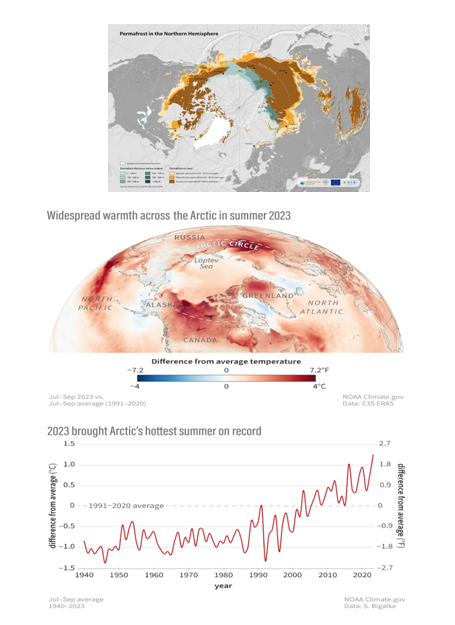

Context
As per a recent study, Alaska Indigenous cultures have an important influence of fishing and related activities and thus needs attention for conservation due to climate change.
About
About the recent updates from Arctic:
- Warmest summer: The year 2023 has etched its mark in history as the Arctic experienced its warmest summer on record, leaving a profound impact on ecosystems and communities across the region.
- Ice Melting: From raging wildfires in Canada to unprecedented melting in Greenland, the signs of climate change are undeniable.
Highlights of the study:
- 2023 Arctic Report Card: The 2023 Arctic Report Card delves into the underexplored realm of subsea permafrost, a hidden danger escalating due to warmer ocean temperatures.
- Subsea permafrost thawing: With vast expanses of subsea permafrost thawing, the release of methane and carbon dioxide poses a serious threat to global warming and ocean acidification.
- Need for research: The report highlights the urgent need for research to gauge the extent and intensity of the potential consequences.
What are reasons behind the condition?
- Rising temperatures: Canada faced a summer of turmoil as wildfires forced evacuations, fueled by a combination of rising air temperatures and dry conditions.
- Early snowmelt: The Northwest Territories bore witness to early snowmelt, exposing vast areas to intense heat, contributing to a record-low North American snowpack.
- Cascading effects: By November 2023, a staggering 70,000 square miles had succumbed to wildfires, emphasizing the cascading effects of climate change.
Other Factors contributing:
- Mackenzie Riverand warm water: The mighty Mackenzie River played a pivotal role in the warming trend, carrying warm water into the Beaufort Sea, accelerating sea ice melting and impacting Alaska's coastline.
- Decline of sea ice in Siberia: Similar patterns were observed in western Siberia, amplifying the decline of sea ice in the Kara and Laptev seas north of Russia.
- Rising fall temperatures: The Arctic's diminishing sea ice emerges as a significant contributor to rising fall temperatures, perpetuating a cycle of heat absorption and release.
Impacts on Indigenous Communities: Disrupted Lives and Livelihoods
- Indigenous communities: Arctic inhabitants, particularly indigenous communities, are grappling with tangible effects of climate change.
- Shifts in sea ice patterns: Shifts in sea ice patterns, unreliable river ice for travel, and the sinking of infrastructure due to thawing permafrost are disrupting traditional ways of life.
- Western Alaska: The article sheds light on the struggles of Indigenous communities in Western Alaska, where the decline of Chinook salmon jeopardizes cultural practices and food security, underscoring the human dimension of climate change.
Adaptation and Healing: Initiatives in the Face of Change
- Adaptation of Communities: Amid challenges, communities are adapting and initiating efforts to heal their landscapes.
- Sámi reindeer herders and conservationists: In Finland, collaboration between Sámi reindeer herders and conservationists aims to restore degraded reindeer habitat, simultaneously preserving cultural practices and mitigating climate change.
Way Forward:
- As temperatures in the Arctic soar at a rate three times faster than the global average, the 2023 Arctic Report Card serves as a stark reminder of the risks associated with climate change.
- Beyond statistics, it illuminates the lives and cultures already disrupted by environmental shifts.
- The urgency for collective action to address climate change and protect the Arctic ecosystem has never been more apparent.



